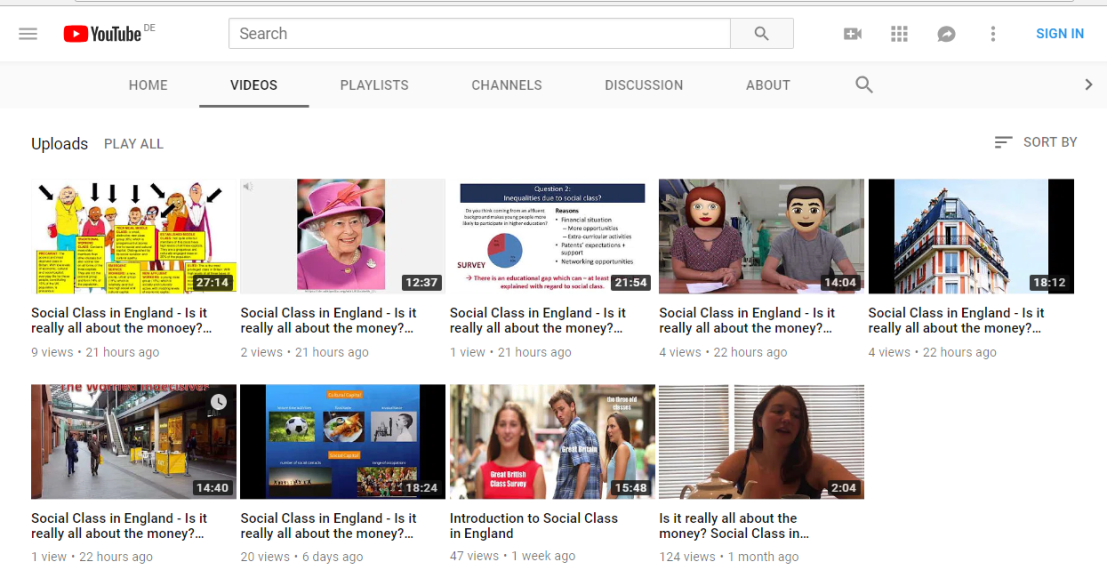“LANG 801: Advanced British Cultural Studies (Special Topic)”
That’s the uninspiring name of a module I was teaching this summer semester. It’s part of an MEd degree programme for future EFL teachers here in Germany.
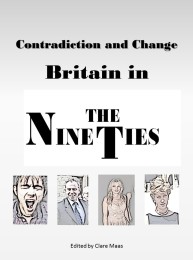
But not to fear – I am always on a mission to capture students’ attention with an interesting ‘Special Topic’ and get them really engaged in the content so they can develop their language and academic skills! Previously, I’ve done “Immigration and Multiculturalism,” “How United is the United Kingdom?,” and “Britain in the 1990s.”
And another thing I’ve started in recent years is getting students to work on a class project with a result that can be shared more widely than just Trier University! We’ve put on an exhibition and written an e-book so far.
This term, my students produced short documentary films, each around 15-20 minutes long, and each on one aspect that influences social class in England. They came up with the catchy title of “Social Class in England: Is it really all about the money?”

You can find the videos on YouTube here. Feel free to enjoy them all, and leave a comment or two of feedback for my students!
If you want to know about the Whys and Hows, read on…
So why do I think projects like this are a good idea?
- I’m required to assess students on written and oral production – students writing the script and recording the audio for the videos allows me to do this.
- If students do in-class presentations, it’s a lot of work to then only share with around 15-20 people.
- In such stand-alone presentations in class, the content is not ‘useful’ for work other students are doing, so they are less engaged as an audience. In the video project, each ‘episode’ connects to other videos, so students actively engage with each other’s work.
- Students develop a stronger bond to the class and their work, which helps them develop team-building skills such as politely criticising, negotiating, and arranging appointments or deadlines. And they can support each other through the film-making process!
- It changes the class atmosphere to something akin to a collaborative business meeting and increases students’ sense of accountability.
- Our roles change – students learn from each other and build up their understanding together. There is little to no ‘teaching’ from me, but I am asked for help or guidance by students – which also means they actually take on board what little I do then say!
- It helps students develop a whole bunch of critical thinking skills; from finding connections between pieces of information, to drawing out key points from their research, digesting the research into concise reports, and considering the most appropriate ways to present something to different audiences.
- It allows students to acquire other practical skills that might be useful in their future careers, such as using the filming equipment or video editing software. (We have all of this at the University but it is sadly underused!)
- I’m sure there are more benefits I can’t think of right now, or am not even aware of!
How did I set up the video project?
- The class met for 90 minutes once a week, for 13 weeks.
- Weeks 1-2 of semester:
- I set reading on the topic of Social Class as homework.
- In lessons, I displayed discussion questions and let students discuss in groups.
- We started off in smaller groups (~5 students) and by week 3 the whole class (16 students) was sitting in a circle debating together.
- The readings and questions encouraged them to evaluate stereotypes and models of social class (e.g. Karl Marx), and to investigate the findings of the ‘Great British Class Survey’.
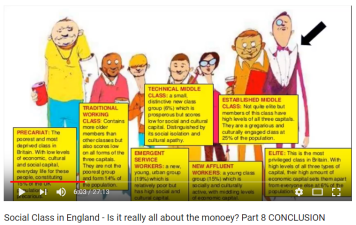 During the discussions, I provided vocabulary or phrases the students were lacking, if asked, and at the end of each lesson, I gave feedback on langauge mistakes I had heard. (I did this every lesson, but won’t keep repeating it in this list!)
During the discussions, I provided vocabulary or phrases the students were lacking, if asked, and at the end of each lesson, I gave feedback on langauge mistakes I had heard. (I did this every lesson, but won’t keep repeating it in this list!)
- Weeks 3-4 of semester:
- From the previous group discussions, students formulated further questions and aspects they wanted to explore.
- They individually chose their own homework readings, as preparation for discussions of these new questions.
- They devised the title “Social Class in England: Is it really all about the money?” and decided on specific aspects they wanted to investigate. Pairs then took on one ‘aspect’ (e.g. housing, education, langauge, consumer behaviour) as the topic for their video, as well as one group working on a general introduction and one on a concluding video.
- During the discussions, I prompted more analysis by throwing in questions where I thought it would be beneficial or where the discussion got ‘stuck’.
- Week 5 of semester:
- In small groups, students began drafting introduction scripts for their videos, highlighting the background that had led them to investigate their specific aspect and the guiding questions for their video.
- At home, they continued reading and researching their specific topics. (Also continued every week, but not repeatedly listed here.)
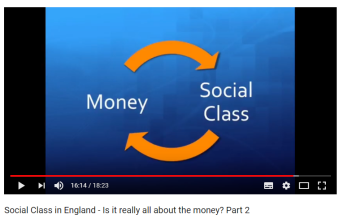
- Week 6 of semester:
- We held a peer review session on the written scripts students had produced so far. Students worked with peer review worksheets I provided (see here).
- We discussed differences between an academic essay and what would be appropriate for a documentary script.
- Weeks 7-9 of semester:
- Students gave ‘work in progress presentations’ in their pairs to share what they had learnt so far, and presenters lead discussions to find connections between topics.
- Some students interviewed contacts / friends from England to gain more insight and check the validity of what they had read.
- Week 10 of semester:
- We had a session led by the technician in the University’s video lab to see the equipment available and how it works, and practised using video editing software.
- Students devised concepts and formats for their videos, such as voice-overs on PPTs, ‘news reporter’ formats, sketches, and so on.
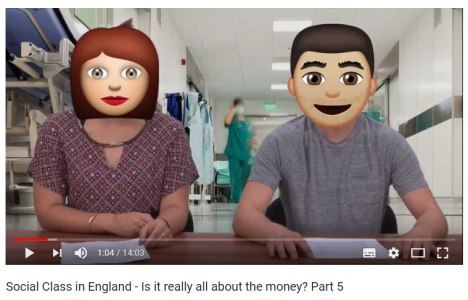
- Week 11 of semester:
- In the video lab, students created a trailer video for the documentary series.
- Students decided on an opening clip to use on all videos, to ‘join’ them together as a series.
- Students investigated copyright laws and potential sources of images and video clips they could use in their own videos.
- Week 12 of semester:
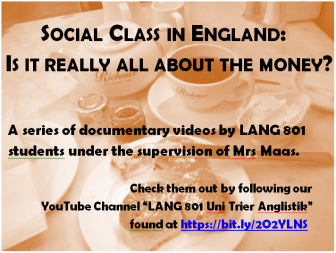
- We held a peer review session on the full scripts each pair had produced.
- Students discussed overlaps and points where they should/could refer to the other videos in the series and inserted these into their scripts.
- Students designed a basic e-flyer to advertise the documentary series.
- Week 13 of semester:
- We held a general discussion about what they had learnt about England and social class over the course of the semester and attempted to connect these insights to their work on other modules (e.g. American culture studies, English literature, etc.)
- Students discussed self-evaluations and completed the obligatory module evaluation forms.
- Students submitted the final drafts of their video scripts for assessment and feedback. I gave feedback on a separate form, and corrected language errors in their scripts so that the videos would not include (too many!) mistakes.
- One month after semester:
- Students recorded their audio scripts and produced their videos independently, with occasional help from the video lab technician.
- I created a YouTube channel and uploaded the videos in the order the students had agreed upon.
- We are now busy sharing the videos and information about the project on social media 🙂
